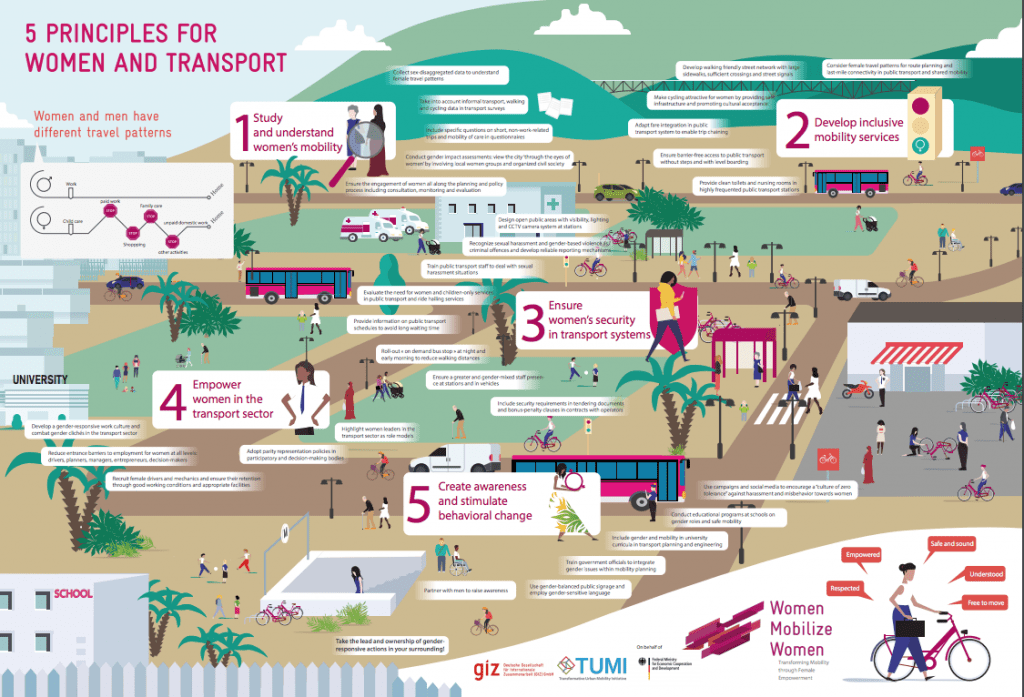Author: Sandra Retzer, GWNET Board Member, Director Development Policy Forum
The challenges women face when it comes to mobility are inclusion, safety, accessibility or entering the workforce in the transport sector. With only 22% of women, the transport sector is definitely not gender balanced.
Mobility is the prerequisite to accessing goods and services, such as health, jobs, education and leisure. Women face more restrictions to mobility and their travel patterns differ from those of men due to their differences in needs and tasks.
Women tend to make more and shorter trips, at more varied times. They use public transport and walk more than men. This often leads to higher expenditures due to the fact that public transport is often based on tariffs that charge per trip, in contrast to time-based charging.
Transport definitely plays a significant role in ameliorating or exacerbating the social conditions of women, particularly those who are poor. And it is proven that as women‘s incomes increase, differences in travel behaviour between men and women decrease.
Safety and security are of primary concern for any transport system and any human being. Nevertheless, the perception of security varies significantly between different women of differing socioeconomic status, race, age, education and cultures.
At the same time, women are at higher risk of being a victim of crime and violence. An ADB policy paper on „A Safe Public Transportation Environment for Women and Girls” (2015) shows that in some cities over 70% of women have experienced sexual harassment in public transport. This often leads to a reduction of using public transport and therefore limiting the quality of life, access to learning, cultural and leisure opportunities of those women.
This may be the reason why women are – according to ITF – more likely to use door-to-door services and ride-hailing services such as Uber or DiDi Chuxing, the world’s largest ride-hailing companies.
But is this the solution? Shifting from public transportation to ride-hailing services and individual motorized transport because of concerns about personal security? Definitely not! The younger generation that is concerned about their environment – I just love Friday’s for Future – should grow up in a world that leapfrogs private car ownership and favours public transport.
Enrique Peñalosa, the Mayor of Bogotá once said: “A developed country is not a place where the poor have cars. It‘s where the rich use public transport. “
And I would add onto that. Public transport has to go hand in hand with non-motorized transport in order to create livable cities. Land use and urban design are the buzz words in the cities! Unfortunately, typically, transportation and land use policies are considered separately which often results in inefficient use of resources and environmental damages.
Do you recognize those cities where very little pedestrian infrastructure is provided to protect women and their children? Cities where cycling pathways are blocked by parked cars.
When I travelled to China for the first time in 1993, it found the kingdom of bicycles and 60% of Beijingers cycled to work- today it is only 12%. In today’s China, we see streets clogged with cars, huge ring roads that cut the cities – these are the limits to growth and governments wish to turn back time.
We should not make the same mistakes in other emerging countries and think of land use and transportation as one. Including women in the process of planning is an important element as they can reveal their travel needs.
And last but not least, we definitely need to increase the share of women working in the transport sector. Jobs need to be more attractive for women, more women need to be involved in decision making and recruiting in order to create a transport sector that is designed for EVERYBODY.
For further reading please check out the 5 Principles to Empower Women in Transport Poster.











